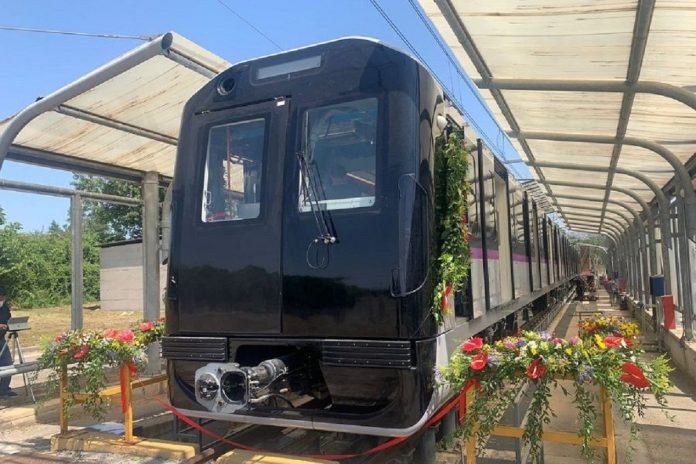Snapshot
Pune Metro coaches are indigenously manufactured under Make in India policy of the union government. Indigenous components of the coaches are over 70 per cent.
Built with aluminum body, Pune Metro coaches are 6.5 per cent lighter than the conventional stainless-steel coaches.
Pune Metro has transplanted 2,267 trees falling on alignment by innovative root ball technology.
Prime Minister Narendra Modi on Sunday (6 March) inaugurated the Pune metro rail project.
The inauguration of the 12-km stretch of the total 32.2-km long project took place at the Garware Metro Station, from where Modi proceeded to take a metro ride to the Anandnagar station.
The total cost of the Pune metro project is over Rs 11,400 crore. The PM had laid the foundation stone for the project on December 24, 2016.
With the 12 km section becoming operational on Sunday and the remaining 21 km becoming operational by March 2023, the project will be a game changer for Pune. This will mark a substantial upgrade of the public transport in Pune.
Pune’s public transport share is 12 per cent and it has the highest two-wheeler population in the country. Thus the daily metro ridership of Pune is expected to increase gradually to six lakh per day.
Maharashtra Metro Rail Corporation Limited (Maha Metro) a joint Special Purpose Vehicle (SPV) of Government of India (GoI) and Government of Maharashtra (GoM), is the executing agency of Pune Metro rail project.
Pune metro has numerous unique features, some of them are listed below.
Lightest Metro: Pune Metro coaches are made with Aluminum Body which has the advantage of being 6.5 per cent lighter than the conventional stainless-steel coaches. These coaches will have longer life and require low maintenance and are more energy efficient.
Made In India: Pune Metro coaches are indigenously manufactured under Make in India policy of the union government. Indigenous components of the coaches are over 70 per cent.
Through international competitive bidding, Maha-Metro awarded the contract for supply of 102 modern aluminum bodied metro coaches for Pune Metro project to M/s. Titagarh Firema, an Italian subsidiary of M/s Titagarh, a Kolkata based Indian company in the field of railway coaches and wagons.
Integration of Rooftop, Grid connected Solar Energy: Pune Metro has made provision for installation of 11.19 MWp Solar power generation on the rooftop of the elevated stations and depots right from the inception.
The energy generated will be used in stations and in traction power for running of trains. This will result in energy cost savings of Rs 20 crores per annum and around 25,000 tonnes of CO2 emissions will be prevented.
‘Ek Pune’ card: Maha Metro has designed an open loop chip based contactless smart card in compliance with the National Common Mobility Card mandate of the union government. This Common Mobility Card can be used for Metro, Buses, Feeders, Parking, Utility and also for other Retail payments.
Space Saving Underground Stations: The underground section of Pune Metro is passing through the most congested location in the city. The space availability in these areas is so limited that the conventional ‘Cut and Cover method’ of building underground stations was not possible.
To overcome this, Maha Metro decided to use the New Austrian Tunneling Method (NATM).
Two metro stations – Mandai and Budhwar Peth have been designed using this technology due to scarcity of space for construction. Also, due to the use of NATM, resettlement and rehabilitation of about 200 residents was avoided.
Zero Effluent Discharge: Maha Metro has signed an MoU with DRDO for installation of anaerobic biodigester technology for 100 per cent wastewater management. This technology will result in zero discharge into the municipal sewerage system for all stations of Pune Metro.
‘No Tree Cutting’ Policy: Pune Metro has transplanted 2,267 trees falling on alignment by innovative root ball technology. Three trees are planted for every transplant undertaken and ten trees are planted for every failed transplant. Maha Metro has also planted 17,986 new trees to make the city greener.


